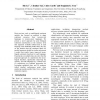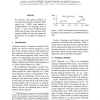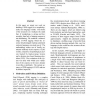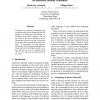110
click to vote
ACL
2012
13 years 4 months ago
2012
We present a novel algorithm for multilingual dependency parsing that uses annotations from a diverse set of source languages to parse a new unannotated language. Our motivation i...
142
click to vote
ACL
2011
14 years 5 months ago
2011
Most previous work on multilingual sentiment analysis has focused on methods to adapt sentiment resources from resource-rich languages to resource-poor languages. We present a nov...
106
click to vote
ACL
2011
14 years 5 months ago
2011
Most previous studies of morphological disambiguation and dependency parsing have been pursued independently. Morphological taggers operate on n-grams and do not take into account...
COLING
2010
14 years 9 months ago
2010
Verb suffixes and verb complexes of morphologically rich languages carry a lot of information. We show that this information if harnessed for the task of shallow parsing can lead ...
105
click to vote
ACL
2010
15 years 4 days ago
2010
We illustrate and explain problems of n-grams-based machine translation (MT) metrics (e.g. BLEU) when applied to morphologically rich languages such as Czech. A novel metric SemPO...
133
click to vote
ACL
2006
15 years 3 months ago
2006
In this paper we report our work on building a POS tagger for a morphologically rich language- Hindi. The theme of the research is to vindicate the stand that- if morphology is st...
101
click to vote
ACL
2008
15 years 3 months ago
2008
We address the problem of translating from morphologically poor to morphologically rich languages by adding per-word linguistic information to the source language. We use the synt...




